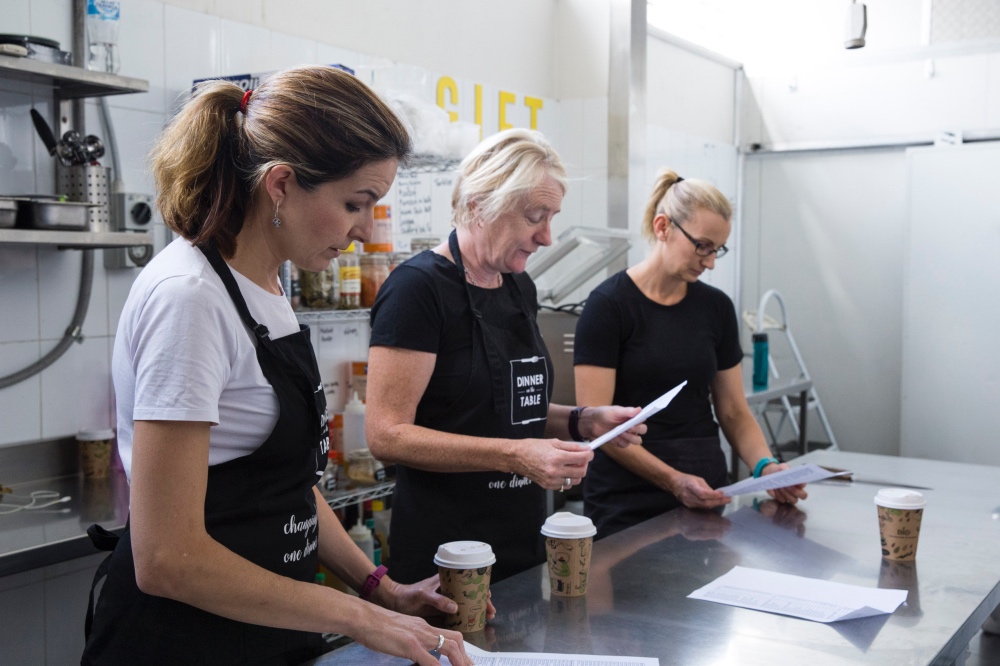
CHRISTOPHER GILBERT reports on how Australian Christian agencies are adapting during the coronavirus pandemic…
Last updated: 5.30pm
Sydney, Australia
Nada Nasser, Mission Australia’s director for the states of New South Wales and Victoria as well as the Australian Capital Territory, is working from home. But the importance of her job in this past month of isolation, social distancing and the loss of “non-essential” jobs remains the same – serving some of Australia’s most vulnerable citizens.
In the midst of a lockdown that has upended every person’s sense of ‘normal’, some 2,000 Mission Australia workers around Australia are confronting the challenge of continuing to deliver more than 500 services to people who are homeless, drug and alcohol dependent, in aged care, mentally ill, suffering domestic violence, disabled or simply young and without support.
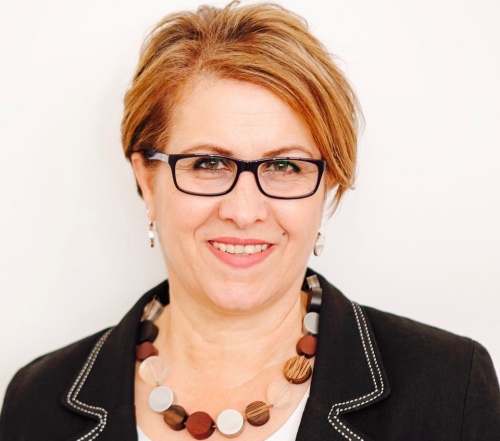
Nada Nasser, Mission Australia’s state director for the states of New South Wales and Victoria as well as the Australian Capital Territory. PICTURE: Supplied
“What has really encouraged me has been the amazing offers from volunteers calling in and the calls from corporate sponsors asking what they can do to assist the agency through the crisis.”
– Nada Nasser, Mission Australia’s state director for New South Wales, Victoria and the Australian Capital Territory
“In NSW and Victoria we have had to move more than 200 services to remote delivery in a short period of time, and that’s a massive change,” Nasser says.
That means delivering many services by phone or online as well as limited face-to-face appointments while in homeless shelters, mental health facilities, drug and alcohol rehabilitation services, and aged care, staff have continued in their roles, albeit with the appropriate safety measures to help the residents avoid contact with COVID-19.
“We’re outbreak free at this stage [mid-April],” Nasser says, “but we’ve had to do some testing on people presenting with what turned out to be ordinary flu symptoms.”
On 20th March, when Australian Prime Minister Scott Morrison announced the first of a series of restrictive social rules to “flatten the curve” of COVID-19 transmission, workers in every Christian agency serving people least able to protect themselves were directly confronted with the impact of the blooming pandemic.
With kids and spouses now at home all day, how would they have sufficient time for the people they served? And if a spouse had lost a “non-essential” job, what then? What happens to homeless people if they can only accommodate one to a room? Could meals for the hungry be provided at all? How could social distancing requirements be observed by people with intellectual disabilities? How will aged care residents cope without being able to go out, or receive visitors? What to do with drug and alcohol rehabilitation? How to help domestic violence victims? And can mental health counselling be delivered in a virtual mode?
Such are the dilemmas for staff and volunteers at national agencies like Mission Australia, Jericho Road, and The Salvation Army.
The Salvation Army echoes the words of Nada Nasser on their website, listing the essential services they cannot provide remotely but will not shut down: residential facilities for homelessness, alcohol and other drug addiction, youth services and family violence.
“We are committed to maintaining these essential services, by providing single room occupancy.” the website explains. “We are also working with hotels to ensure safe places can be made available for vulnerable Australians. We will continue to do what we can to increase services, particularly in the areas of family and domestic violence and youth services.”
Nasser says that with most of Mission Australia’s funding provided by government, the service has not been much affected by the economic shut down although restaurant isolation policies have meant it’s not possible to maintain roles for casual staff at a small social enterprise.
“What has really encouraged me has been the amazing offers from volunteers calling in and the calls from corporate sponsors asking what they can do to assist the agency through the crisis,” she says.
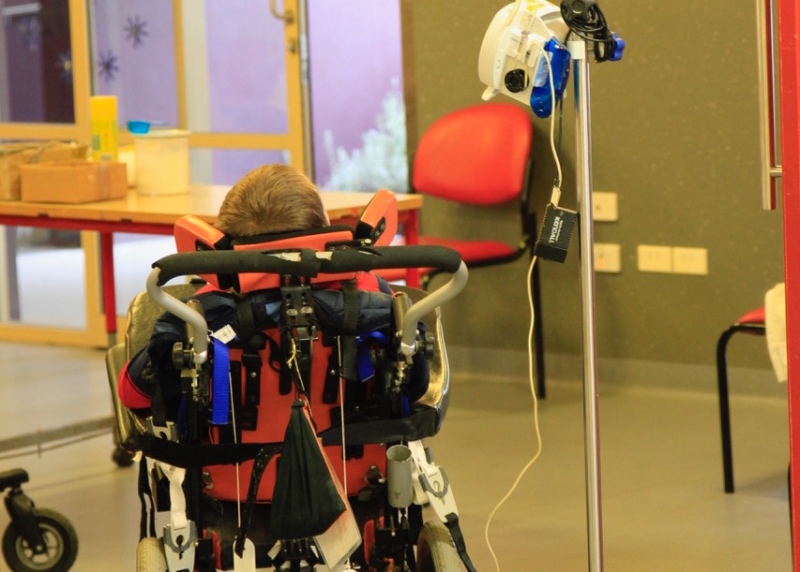
The Allowah Presbyterian Children’s Hospital, a hospital and NDIS provider for children with complex needs and disabilities. PICTURE: Supplied.
The Presbyterian Church of Australia’s Jericho Road ministry is also responding on multiple levels.
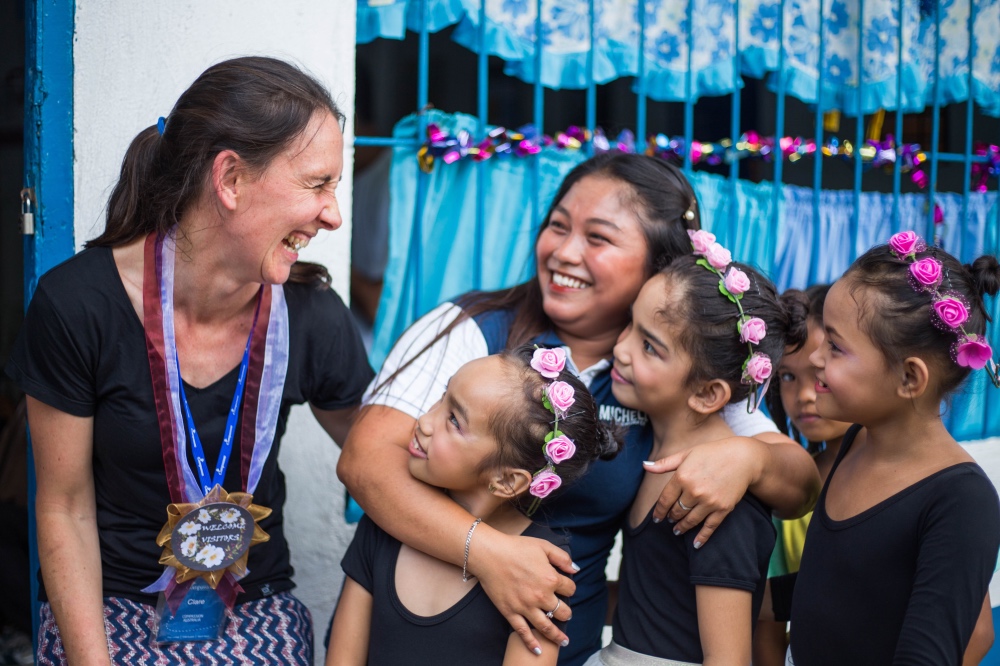
Compassion Australia’s CEO Clare Steele, left, in The Philippines. PICTURE: Supplied.
INSIDE COMPASSION AUSTRALIA’S CORONAVIRUS RESPONSE
For Compassion Australia CEO Clare Steele, the coronavirus pandemic has meant 12 hour days on video-conferencing app Zoom, sometimes starting at 4am. She has had to reconfigure how the organisation interacts with churches, replacing Compassion Sundays with recordings or live-streaming of messages. And she’s delighted to be partnering with Colin Buchanan to offer kids’ talks to the churches to engage the children in Compassion’s mission. But she can no longer travel to the many places around the world where her teams work.
“Although there’s lots of things I didn’t expect, the vulnerable children – it’s just one more threat for them,” she says. “COVID-19 is among a number of threats. Poverty isn’t going to be fixed by the vaccine that’s coming for COVID. It’s going to endure. Mostly we know that God hasn’t changed, He’s steadfast and wants to really minister to these kids. While the execution of what my role would be is very different, the heart of what it is hasn’t changed at all. My work is still releasing children from poverty in Jesus name.”
CJ Calinao is a Compassion alumnus from the Philippines island of Mindanao where Islamic terrorism has kept the island’s people locked in poverty. Now a Compassion Philippines travel visitation specialist, Calinao got stuck in Australia because of sudden travel restrictions. Staying with a sponsor family in Strathfield in Sydney, he’s painfully aware of the dire circumstances facing his people in Manila, a densely populated city with a population the size of Australia’s where social isolation is an impossible luxury.
“We’re under martial law at the moment,” he says. “It’s crazy. The government is planning to enforce a total lockdown. But daily wage earners won’t be able to collect water or earn money for food. There’s a lot of panic and rage, and protests are happening. Just to calm things down they promised every person 8000 pesos ($A220) for the month of lockdown so far, but it hasn’t been delivered yet. The people are too familiar with corruption and so they are suspicious and protest.”
Steele, meanwhile, is pleased to find Australian churches everywhere reporting that many more people are attending live-streamed services than walk through the doors on a normal Sunday, meaning more people are hearing about the needs of children in poverty.
“The Compassion model is churches supporting churches, and the frontline churches in the Philippines are doing extraordinary things using social media apps to stay connected and active,” she says, noting that Compassion employees are also visiting children’s families to check on their safety.
“[W]e have opportunity for the wider church to support those churches nearby – it might mean giving. It means we are united. I mean, what a chance: a global church against global pandemic. It’s actually an opportunity to be the church.”
From her home, Jericho Road CEO Elizabeth McClean oversees Allowah Presbyterian Children’s Hospital, an NDIS provider for children with complex needs and disabilities which provides counselling services, chaplaincy services to police and hospitals, prison chaplaincy and disability advocacy while still finding ways to support the churches that care for families suffering from drought and bushfires.
Her chief concern at the hospital, she says, is for the safety of the children.
“Many are very vulnerable to respiratory illness at the best of times,” McClean says. “That has changed what we can provide onsite as we limit access, including cancelling our school holiday programs and the like. Our nursing and other key staff are still onsite to care for the children and support families. Our therapists are doing a brilliant job of transitioning to online therapy provision.”
Jericho Road was among the first to flag a significant obstacle to food provision by Christian ministries. New regulations in response to the COVID-19 crisis forbid their service to access the normal donors: churches where people gather together and do bulk cooking which is frozen and delivered according to need. And food pantries maintained by donor groups are also newly restricted in what they can provide and how it can be provided.
To adhere to the rules laid out by the NSW Food Authority, the Jericho Road website now says: “All community kitchens, dinners, breakfasts and the like that provide cooked food to groups must cease to operate immediately. This is in line with government restrictions with regard to gatherings and is also protective of the people we serve in terms of the food preparation and provision.”
Then follows a long list of new compliance rules which Jericho Road encourages their donors to embrace for the sake of the many more people who now need their help.
In Victoria, The Salvation Army – through its Wyndham City Corps’ Cafe Agape, has found it can replace a two-course community meal twice a week by serving all meals as takeaway. They’re also forming partnerships, like that with Second Bite under which they produce ‘Corps Care Packages’ – consisting of fruit, vegetables and other staples. In Laverton, meanwhile, the Hobsons Bay Corps outreach team is delivering meals to local people who usually visit the soup van on Friday nights.
In Sydney, Rachel Golding, a social business entrepreneur who also assists families in need with meals, says her business is in survival mode.
“We’re a social mission in uncharted waters,” she says. “Pressures on families are now larger. We have always been about supporting the daily lives of households, relieving some of the pressure. But we’ve morphed into simply feeding people and discussing how we can do this.”
Golding began “Dinner on the Table” eight years ago as a business whose profits might assist families with disabled children to have a meal freely provided at least once a week. While the catering side of her business had thrived, she was able to fulfil the dream of providing meals pro bono. But the Prime Minister’s announcements shut down the money-making side of the business completely, as it did for the entire industry.
“We’ve had to reel it back,” sighs Golding, who starts her work day at 5am.
In an effort to keep her philanthropy alive, Golding is now negotiating with aid agencies that have lost their normal catering supply lines, to see if her frozen meal delivery can meet their need.
While Golding admits great sadness in having no work for her casual caterers, she has been able to retain her long-term employees who have risen to the challenge of lonelier work in the commercial kitchen in teams of only three people at a time – “two cooks and a washer-uperer”.

Preparing meals at Dinner on the Table. PICTURE: Supplied.
For international aid agencies operating out of Australia, the challenges are even more confronting with frontline workers operating in nations where there are minimal or no safety nets.
“We’re yet to see full impact of COVID-19 on countries that I’ve worked in for 20 years like Pakistan, Afghanistan, Mozambique,” says World Vision Australia’s acting CEO Graham Strong, who is working from his Melbourne home with his spouse and children. “They just don’t have the resources that Australia has. Social safety net mechanisms for these places are going to be very challenging for those governments to put in place.”
Strong says that high levels of urban density means there is no possibility of the social distancing that Australians can assume. But beyond the likely ravaging of these populations by COVID-19, he also draws attention to the greater threat of secondary impacts on the 30 million children that World Vision is concerned for.
When Sight spoke with Strong, World Vision International had just released a report, Aftershocks, that spelt out the acute secondary impact issues faced by children around the world in the face of the coronavirus pandemic.
“Current child deaths are low because severe novel coronavirus infections are rare among children but as many as 30 million children’s lives are in danger from secondary health impacts,” the report explains.
According to Strong that’s because of their vulnerability to other deadly diseases thanks to a lack of immunisation, increasing malnutrition, and a 50 per cent increase expected in deaths from malaria. The report demonstrates that the combination of pre-existing weak health systems, populations with high need, and this current pandemic may lead to catastrophic mortality for these children in the 24 of the most fragile nations of the world. The danger to their lives has been assessed based on the secondary impacts on children observed through the Ebola crisis of 2014 to 2016 in Africa.
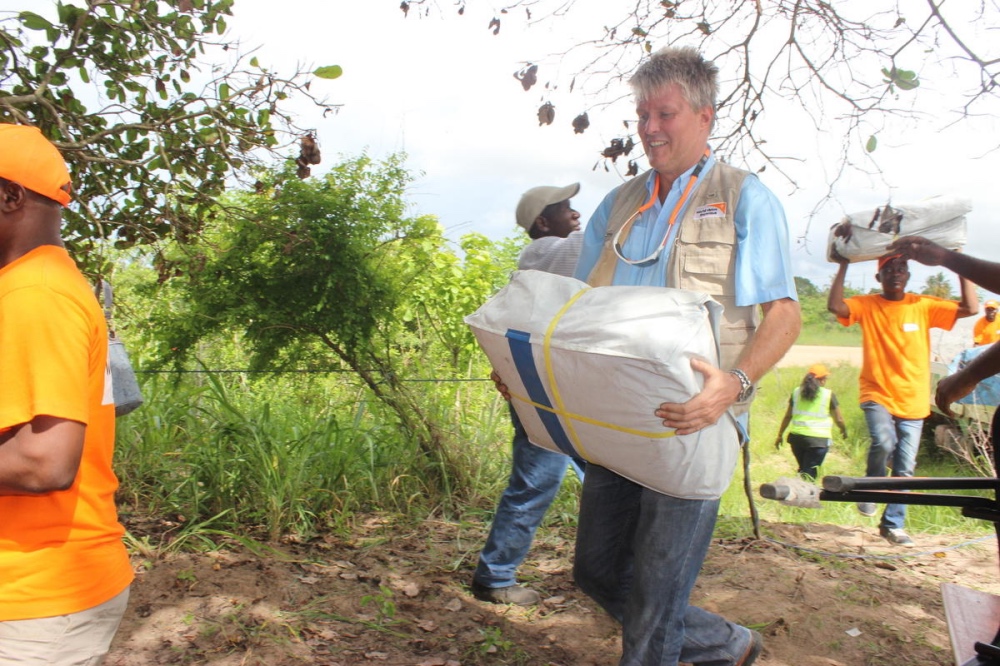
World Vision Australia acting CEO Graham Strong in Mozambique. PICTURE: Supplied.
Jericho Road’s CEO is also aware of the dangers abroad as well as onshore.
“As Australians we need to be aware that for many of us we are very privileged to be able to change our lives to increase our safety,” says McClean. “This is not the case for many people in the world. We should be aware that the people most likely to be impacted by the changes brought on us by COVID-19 are those who were already vulnerable – those who were already financially at risk, personally at risk, socially at risk, physically at risk.”
Like other organisational leaders spoken to by Sight, McClean has been impressed by the response of her staff.
“The last few weeks have been very complex and very tiring – there are so many changes and decisions that have to be made within a context where there are many unknowns,” she says. “But within that I’ve seen my team adapt, dig deep and focus on the really important things. I’ve seen God’s people continue to be generous and caring, innovative and creative. I’ve seen God at work in people’s lives and opportunities open up to make Jesus known. God is good.”
Correction: The figure in the third paragraph has been corrected from 400 to 200 at Mission Australia’s request.





